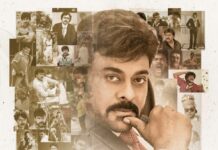NOTE: We are reproducing the interview of director and cinematographer KV Anand, who died today. The interview was taken by Sri Atluri back in 2009. Read on..

t was Shriya who introduced me to K.V. AnandgaaruafterSivajiwas released. When I did his interview at that time, he informed me that he was not doing Shankar’s next film as he’s planning to direct a film again. (He directedKana Kandaenin Tamil starring Sriram and Prithviraj, which was later dubbed into Telugu asKarthavyam). After a few months, he informed that he was soon to direct Surya, the hottest star in Kollywood! And finally, last month, the filmAyanreleased and went on to be the biggest hit in Surya’s career, even surpassingGhajini. When I called him to congratulate him on the success of the film, he informed me that he was planning to come to the USA to attend a meeting in Los Angeles and that he’d be visiting his brothers living in the USA too. Though his schedule was tight, he readily agreed to spare some time to sit with me personally. We went to have a light lunch and sat for a couple of hours talking about movies. Excerpts of our conversation are presented to the readers of TeluguCinema.Com in the form of the current interview as the Telugu version ofAyan, titledVeedokkade, is gearing up for release.
Sri: How did the combination with Surya happen?
K.V. Anand:I knew Surya from the days of his debut withNerakku Ner(dubbed asMukhamukhiin Telugu), as I was the cameraman for that film. In my directorial debut film Kana Kandaen (Karthavyam) too, he was supposed to Prithviraj’s role but he was hesitant to do a negative role and opted to do Sriram’s role instead, but I wanted to take him for the negative role itself. Thus, we dropped the idea of working together for that film and he promised to another film in my direction. When we accidentally ran into each other at a studio while shooting for Sivaji, he asked me if anything was ready yet. He liked the short story line I narrated and asked me to work on it. That’sAyan(Veedokkade) now.
Sri: So, how was working with Surya…
K.V. Anand:Simply put, Surya is a director’s actor who has no hang-ups of a star, and he works really hard. I do not think any other hero would be ready to do scenes like getting beaten by a prostitute, but he did such scenes without a question. I thought people might not accept it, but the response was amazing. People’s response was equally encouraging in the scene where Tamannah yells at him. Girls are going gaga over him during songs. I believe he also has a good fan following among college-going youth.
Sri: Tell me about the rest of the cast…
K.V. Anand:Tamannah was selected after watchingHappy Days. I liked her in that film and selected her forAyan(Veedokkade). Our initial choices for the role of Akashdeep were Bollywood actors Arjun Rampal or Dino Moria. Dino was really expensive and Arjun was expensive too, but their dates were also not readily available. We then zeroed in on Akashdeep.
Sri: How are the collections ofAyan?
K.V. Anand:I do not know the exact numbers, but the production house AVM says that it’s the biggest hit among Surya’s films so far! Times of India carried a special article on “unstoppable Surya”.
Sri: People say it is apucca masalafilm…
K.V. Anand:I do not agree at all if someone says that! Amasalafilm generally refers to a regular film with formulaic fights and songs. This film is not really in the same league. We did intense research of howkurvi(post, another word of smuggling in Tamil) happens; we even talked to several people in Chennai’s Burma Bazaar, and more…
Sri: People say it has shades ofCatch Me If You Can(Leonardo DiCaprio-starrer directed by Steven Spielberg),Quantum of Solace(Daniel Craig’s latest James Bond film). Also, drugs being carried in stomach seems to be inspired by the Mexican filmMaria Full of Grace…
K.V. Anand:The film story is as old as the Himalayas, and anyone can tell uncountable movies with similarities. The truth is that the movie is based on the novel by Sujatha that was written much before the 1990s. Both the English movies you mentioned were released after this novel came out, and I have all the proof to support my statement. Only one scene was taken from the Mexican film though – the scene where people get blindfolded and take drugs to gulp them down to carry with them. Nothing else was taken from anywhere!
Sri: Surya’s chase shot in foreign locales is similar to the first chase scene inQuantum of Solace, though!
K.V. Anand:(Laughs) Use any martial art like karate or kung-fu, and people quickly call it a copy of Jackie Chan’s or Bruce Lee’s films! The chase inVeedokkadeis called “parkour”, which is considered close to martial arts. It became popular with films likeCasino RoyaleandQuantum of Solace, but the art form is itself is old enough – parkour has its roots in times before World War I!
Sri: How was the scene executed? Did you use wires like we generally do in fight scenes or…
K.V. Anand:No wires were used for the scene. It’s completely done with hard work, I should say. When we had that scene planned, the stunt-master came from South Africa along with two of his assistants. I showed him where the fight is supposed to be shot. He took all the necessary measurements at the location and discussed how the fight must be done. He went back, designed it as planned, and practiced it applying the measured dimensions, and all this was much before the actual shooting. When we scheduled to shoot, Surya went on rigorous training for three days and refused to go with a stunt double (dupe). We shot the fight for seven days that followed the three days of training.
Sri: What type of camera did you use for the fight? Steady-cam is the usual choice, right?
K.V. Anand:That’s right, steady-cam is the best for chase scenes, and we used the same for this fight.
Sri: And the scene where Surya’s friend gets killed? How did you shoot that one?
K.V. Anand:We used the jimmy jib camera crane for it. We hired it for seven days, and I used it for the scene fully, so that we get aerial shots as well as close-up shots with it.
Sri: As digital technology catches up now, do you prefer the conventional camera or the digital?
K.V. Anand:Digital technology is here to stay. It’s much cheaper then the camera roll, but the cinematography department is differently organized for both. Most screens in Tamilnadu are now digital.
Sri: Being a celebrated cinematographer yourself, how is that you do not handle the camera when you direct?[M.S. Sundararajan for Karthavyam and M.S. Prabhu for Veedokkade handled the camera.]
K.V. Anand:Both direction and camera-work are two different full-time jobs that cannot be handled by one individual. I feel that one cannot do justice to both jobs if one handles both. I thus am a director alone when I direct, and I don’t go behind camera as a director.
Sri: How much freedom would you then give to the cameraman? What advantage would a cameraman gain while working for you? Usually, most other directors don’t have much knowledge with camera setups and thus leave the cameraman to the job, but camera is yourprima forte!
K.V. Anand:Yet, I do give complete freedom to them, with zero interference. I just tell my cameraman what I want and I leave the rest for them to handle. I might give a suggestion or two about lighting so that the work can pace up but I don’t interfere in their work more than that! That’s the whole purpose of limiting myself to direction, right?
Sri: Any plans of making a direct Telugu film or a bilingual?
K.V. Anand:I cannot claim to be familiar with the language yet, though I do understand it. I cannot communicate fluently in Telugu, and thus I feel I cannot do justice to directing a film in a language I cannot communicate well. So, as of now, I do not have any plans of doing a straight Telugu film or a bilingual. I cannot guess about the future, though.
Sri: What difference do you see in Telugu and Tamil film industries really?
K.V. Anand:Telugu film industry pays good remuneration and gives importance to writers, compared to Tamil film industry.
By Sri Atluri






